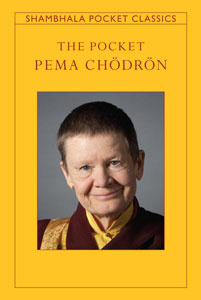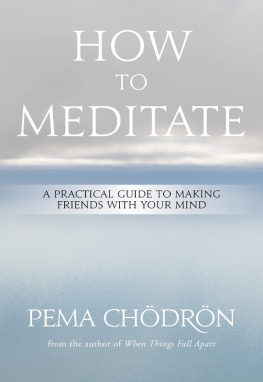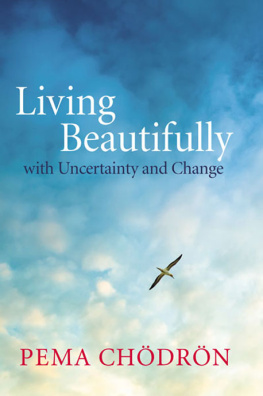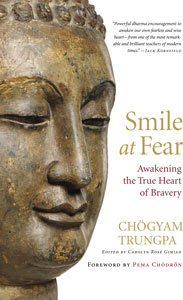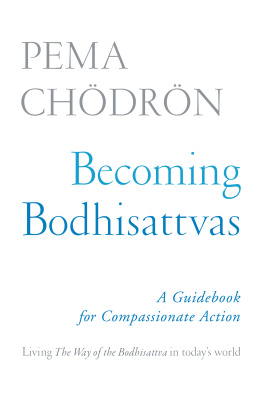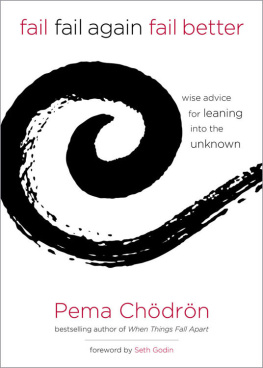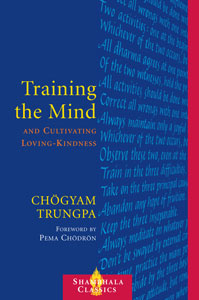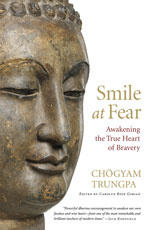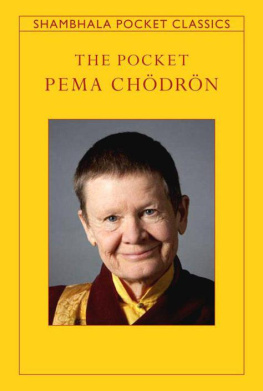BOOKS BY PEMA CHDRN
Awakening Loving-Kindness
Becoming Bodhisattvas
Comfortable with Uncertainty
The Compassion Book
Living Beautifully
The Places That Scare You
The Pocket Pema Chdrn
Practicing Peace
Start Where You Are
Taking the Leap
When Things Fall Apart
The Wisdom of No Escape
Shambhala Publications, Inc.
4720 Walnut Street
Boulder, Colorado 80301
www.shambhala.com
2019 by the Pema Chdrn Foundation
Excerpts from Fail, Fail Again, Fail Better 2015 by Pema Chdrn are used with permission of the publisher, Sounds True, Inc. Basic Sitting Meditation originally appeared in Start Where You Are: A Guide to Compassionate Living, 1994 by Pema Chdrn, published by Shambhala Publications. Tonglen Practice is adapted from When Things Fall Apart: Heart Advice for Difficult Times, 1997 by Pema Chdrn, published by Shambhala Publications.
All rights reserved. No part of this book may be reproduced in any form or by any means, electronic or mechanical, including photocopying, recording, or by any information storage and retrieval system, without permission in writing from the publisher.
For more information please visit www.shambhala.com. Shambhala Publications is distributed worldwide by Penguin Random House, Inc., and its subsidiaries.
Book design by Steve Dyer, adapted for ebook
Cover art by Merr Watson/Women Who Drone/Getty Images
Cover design by Daniel Urban-Brown
L IBRARY OF C ONGRESS C ATALOGING - IN -P UBLICATION D ATA
Names: Chdrn, Pema, author.
Title: Welcoming the unwelcome: wholehearted living in a brokenhearted world / Pema Chdrn.
Description: First Edition. | Boulder: Shambhala, 2019.
Identifiers: LCCN 2018059669 | ISBN 9781611805659 (pbk.: alk. paper)
eISBN 9780834842618
Subjects: LCSH : Spiritual lifeBuddhism. | Bodhicitta (Buddhism)
Classification: LCC BQ 7805. C 494 2019 | DDC 294.3/444dc23
LC record available at https://lccn.loc.gov/2018059669
v5.4
a
This book is dedicated to
KHENCHEN THRANGU RINPOCHE
with love, devotion, and gratitude for all his support and kindness to me over many years.
CONTENTS
1
Begin with a Broken Heart
Our aim is to fully awaken our heart and mind, not just for our own greater well-being but also to bring benefit, solace, and wisdom to other living beings. What motivation could top that?
W HEN YOU ENGAGE WITH SPIRITUAL TEACHINGS , it is wise to know your intentions. For example, you may ask yourself, What is my purpose in reading this new book, with its ominous title Welcoming the Unwelcome? Are you reading it because times are uncertain and you want some clues about what will help you make it through whatevers coming? Are you reading it to gain wisdom about yourself? Do you hope it will help you get over certain emotional or mental patterns that undermine your well-being? Or did someone give it to youwith lots of enthusiasmand now you dont want to upset them by not reading it?
Your motivation may include some or all of the above. They are all good reasons (even the last one) for reading this or any book. But in the Mahayana Buddhist tradition to which I belong, when studying spiritual teachings, we set out by arousing an even greater motivation, known as bodhichitta. In Sanskrit, bodhi means awake and chitta means heart or mind. Our aim is to fully awaken our heart and mind, not just for our own greater well-being but also to bring benefit, solace, and wisdom to other living beings. What motivation could top that?
The Buddha taught that all of us, at our essence, are good and loving. Because of this basic goodness, we naturally want to be there for others, especially those who are closest to us and those who are in the greatest need. We are keenly aware that others need us, and that our society and the planet as a whole need us, especially now. We want to do what we can to alleviate the fear, anger, and painful groundlessness that so many of us are experiencing these days. But what often happens when we try to help is that we find our own confusion and habitual tendencies getting in the way. I hear people talking like this: I wanted to help at-risk teenagers, so I studied and trained, and I went into social work. Two days into the job, I found myself hating most of the kids! My initial feeling was Why cant we just get rid of all these kids and find some nicer ones who will cooperate with me? It was then that I realized I had to clean up my own act first.
Bodhichitta, the awakened heart, begins with the wish to be free from whatever gets in the way of our helping others. We long to be free from the confused thoughts and habitual patterns that cover up our basic goodness, so that we can be less reactive, less fearful, and less stuck in our old ways. We understand that to whatever degree we can get beyond our neuroses and habits, we can be more available for those teenagers, for our family members, for our larger community, or for the strangers we meet. We may still be going through strong feelings and reactions on the inside, but if we know how to work with these emotions without falling into our usual ruts, then we can be right there for others. And even if theres nothing dramatic we can do to help, other people will feel our support, which actually helps a lot.
Bodhichitta begins with this aspiration, but it doesnt stop there. Bodhichitta is also a commitment. We commit to doing all it takes to free ourselves completely from all our varieties of confusion and unconscious habit and suffering, because these prevent us from being fully there for others. In the language of Buddhism, our ultimate commitment is to attain enlightenment. In essence, this means knowing fully who we really are. When we are enlightened, we will be fully awake to our deepest nature, which is fundamentally open-hearted, open-minded, and available for others. We will know this to be true beyond any doubt, beyond any going back. In this state, we will possess the greatest possible wisdom and skill with which we can benefit others and help them to awaken completely themselves.
To fulfill the commitment of bodhichitta, we will need to learn everything there is to learn about our own heart and mind. This is a big job. It will most likely include reading books, listening to teachings, and deeply contemplating what we study. We will also learn a great deal about ourselves by having a regular practice of basic sitting meditation. In the back of the book Ive included a simple meditation technique you can use anywhere. Finally, we will have to test and clarify our growing knowledge by applying it to our own lives, to the situations we naturally find ourselves in. When bodhichitta becomes the basis for how we live each day of our lives, then everything we do is meaningful. Our existence feels incredibly rich. This is why it makes so much sense to bring to mind bodhichitta as often as possible.
Sometimes the wonderful motivation of bodhichitta arises easily. But when were feeling anxious or self-concerned, when our confidence level is low, bodhichitta can seem beyond our reach. In such times, how can we uplift our hearts to generate the courageous longing to wake up for the benefit of others? How can we intentionally turn our mind around when it is feeling small?
My root teacher Chgyam Trungpa Rinpoche taught me a method for transforming the mind that I still follow. The first thing to do is to bring to mind a poignant image or story, something that naturally warms up your heart and puts you in touch with the human predicament. Maybe someone you really care about has recently been diagnosed with cancer or a degenerative disease. Or someone you care about with drug or alcohol problems, who has been doing well for a long time, has just relapsed. Or perhaps your dear friend has suffered a great loss. Maybe you saw something sad when you went to the grocery store, such as a painful interaction between a parent and a child. Or you think about the homeless woman you always see on the way to work. Or maybe you were affected by something you read in the news, such as a story about a famine or a family being deported.


